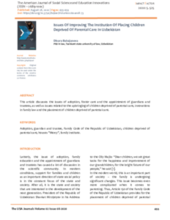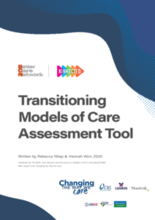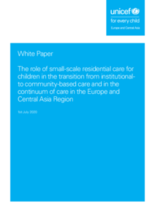Displaying 101 - 110 of 662
This book provides new and empirically grounded research-based knowledge and insights into the current transformation of the Russian child welfare system. It focuses on the major shift in Russia’s child welfare policy: deinstitutionalisation of the system of children’s homes inherited from the Soviet era and an increase in fostering and adoption.
In this study on childcare staff in children’s homes of Kasaragod district of Kerala, the researcher adopted a descriptive design and selected all registered children’s homes for the study purpose.
This article offers a Local Process Initiative (LPI) process in the Devinuwara Divisional Secretariat Division (DSD) in the Matara District of Sri Lanka as an effective strategy for the deinstitutionalisation and quality alternative care of children in South Asia.
This article discusses the issues of adoption, foster care and the appointment of guardians and trustees, as well as issues related to the upbringing of children deprived of parental care, innovations in family law and the placement of children deprived of parental care in Uzbekistan.
This tool is designed as an assessment framework that assists practitioners to identify and analyze the key starting point dynamics and determine implications for strategy in their work to transition an organization's model of care of children from institutional to a non-institutional model.
This launch webinar provided an introduction to the Transitioning Models of Care Assessment Tool, an assessment framework that assists practitioners to identify and analyze key starting point dynamics and determine the implications for strategy in supporting organisations to transition from an institutional to non-institutional model of care.
This study examined deinstitutionalisation in Thailand. Qualitative interviews were conducted with a total of 27 child welfare practitioners and policy actors to explore their perceptions of Thai alternative care provision.
This White Paper summarizes evidence on the current use and impact of small-scale residential care (also: ‘SSRC’) and offers guidance on how to enable all children to grow up in a loving and stable family environment. It aims to promote better decisionmaking among policy-makers, local governments, non-governmental organizations (NGOs), as well as child welfare and other, allied practitioners of the establishment.
In this commentary piece, Anne Longfield, Children’s Commissioner for England, explores the use of children's care homes in England and the need for improved supports to prevent placement in children's home and to provide for the needs of children and young people who are placed in these homes.
This Lancet Group Commission, published between The Lancet Child & Adolescent Health and The Lancet Psychiatry, advocates global reform of the care of separated children through the progressive replacement of institutional provision with safe and nurturing family-based care.



